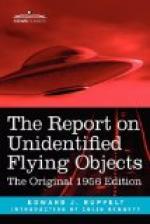Each of the fifty of our best sightings that we gave the scientists to study had some kind of a loophole. In many cases the loopholes were extremely small, but scientific evaluation has no room for even the smallest of loopholes and we had asked for a scientific evaluation.
When they had finished commenting on the reports, the scientists pointed out the seriousness of the decision they had been asked to make. They said that they had tried hard to be objective and not to be picayunish, but actually all we had was circumstantial evidence. Good circumstantial evidence, to be sure, but we had nothing concrete, no hardware, no photos showing any detail of a UFO, no measured speeds, altitudes, or sizes—nothing in the way of good, hard, cold, scientific facts. To stake the future course of millions of lives on a decision based upon circumstantial evidence would be one of the gravest mistakes in the history of the world.
In their conclusions they touched upon the possibility that the UFO’s might be some type of new or yet undiscovered natural phenomenon. They explained that they hadn’t given this too much credence; however, if the UFO’s were a new natural phenomenon, the reports of their general appearance should follow a definite pattern— the UFO reports didn’t.
This ended the section of the panel’s report that covered their conclusions. The next section was entitled, “Recommendations.” I fully expected that they would recommend that we as least reduce the activities of Project Blue Book if not cancel it entirely. I didn’t like this one bit because I was firmly convinced that we didn’t have the final answer. We needed more and better proof before a final yes or no could be given.
The panel didn’t recommend that the activities of Blue Book be cut back, and they didn’t recommend that it be dropped. They recommended that it be expanded. Too many of the reports had been made by credible observers, the report said, people who should know what they’re looking at—people who think things out carefully. Data that was out of the circumstantial-evidence class was badly needed. And the panel must have been at least partially convinced that an expanded effort would prove something interesting because the expansion they recommended would require a considerable sum of money. The investigative force of Project Blue Book should be quadrupled in size, they wrote, and it should be staffed by specially trained experts in the fields of electronics, meteorology, photography, physics, and other fields of science pertinent to UFO investigations. Every effort should be made to set up instruments in locations where UFO sightings are frequent, so that data could be measured and recorded during a sighting. In other locations around the country military and civilian scientists should be alerted and instructed to use every piece of available equipment that could be used to track UFO’s.
And lastly, they said that the American public should be told every detail of every phase of the UFO investigation—the details of the sightings, the official conclusions, and why the conclusions were made. This would serve a double purpose; it would dispel any of the mystery that security breeds and it would keep the Air Force on the ball—sloppy investigations and analyses would never occur.




